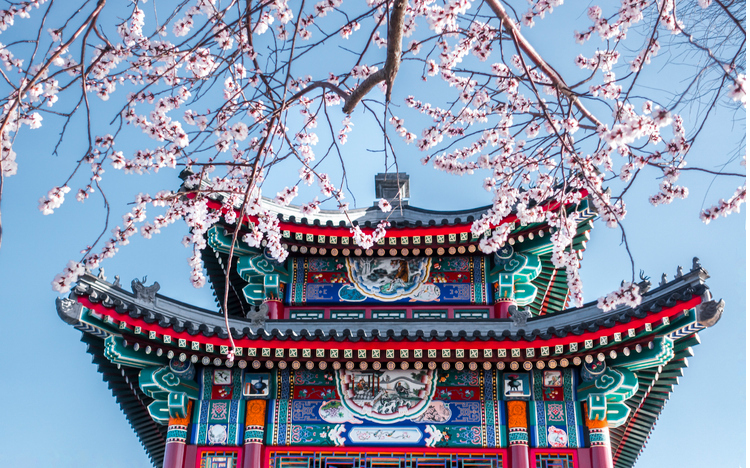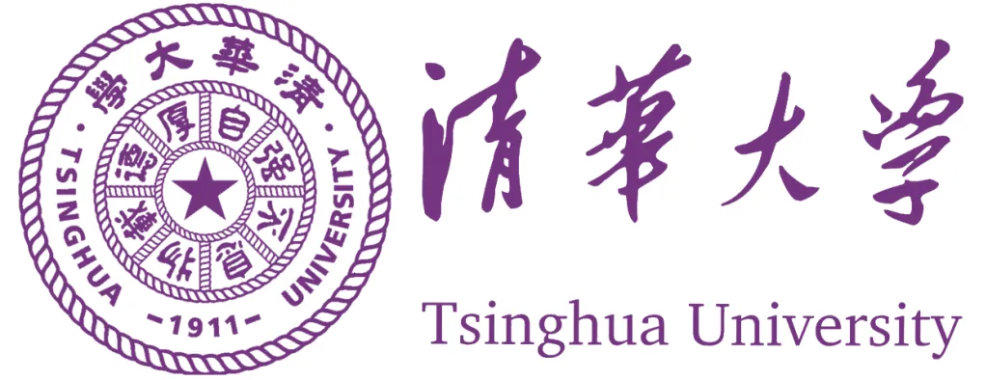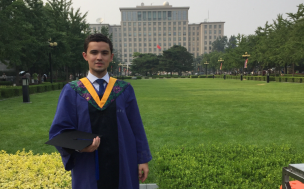To understand more, we spoke with two Global MBA students who made the move to study in Beijing, China, at Tsinghua University School of Economics and Management (Tsinghua SEM). Jenny Peterlin is from the US while Sergi Drago is from Spain.
Find out how they went about setting up their MBA journey in China, such as student visas, banking, and WeChat accounts, plus what support they received from the school.
Why China as a business school destination
Jenny’s love for China began at a young age after becoming friends with her Chinese classmates at an elementary school in the US that had a large Chinese student population.
This love and interest in China carried on into her later education and career, where she studied Chinese at university and she had some Chinese clients during her former healthcare consulting role.
Sergi had a similar appreciation for Chinese culture from an early age since his childhood best friend was Chinese.
He had also worked with a Chinese tech company prior to his Tsinghua Global MBA and had spent time travelling back and forth to China during that time. He says that moving to Beijing for his studies was a natural step to access technology careers in the technologically advanced nation.
“Studying for an MBA in China offered a great opportunity to make contacts here,” he says.
Navigating challenges and setting up your life in China
When moving to a new country, it can often be the smallest things that prove to be the most challenging.
“When you first arrive in China, there is a one- to three-week adjustment period where you will be figuring out how to pay for everything, getting your health examination, and setting up your phone number,” says Jenny.
Just like in Japan, Korea, and several other countries, a health check to secure your visa is mandatory. For international students planning to study in China for longer than six months, you will need to apply for the China Student Visa X1 to enter the country, which requires the submission of various key documents. Within 30 days of your arrival in China, you will then need to apply for a Temporary Residence Permit.
“Once you get that done, it becomes a lot easier to arrange things like your phone. It’s reassuring that all international students are going through the same thing,” says Jenny.
China is a famously largely cashless society, and most foreign students opt to use the popular phone apps Alipay and WeChat Pay for payment.
To set up Alipay or WeChat Pay, you will need to first set up your bank account in China. You will need your valid passport, residency permit, visa, and a filled-out account opening application.
Once your bank account is set up, you may wish to add your bank card on Alipay and WeChat Pay to ensure a smooth payment process on your phone.
Jenny recalls a time when she struggled to pay for her rental bike on campus due to some issues with her banking. She needn’t have worried, however, as her fellow students rushed over to pay.
“There’s such an openness and welcomeness to Chinese culture,” she says.
Despite the early-day admin tasks, before Jenny and her fellow international students even stepped foot into China, Tsinghua reached out to provide support with initial preparations.
“They responded immediately and did everything they could to help you,” says Sergi.
Staff from Tsinghua MBA programs helped Sergi and other international students navigate issues such as setting up WeChat by connecting them with their own buddy from the MBA program.
Becoming well equipped for cultural differences in China
There are many aspects of Chinese culture that you’ll only learn while you’re living in the country. China embraces a collective rather than individualistic culture, and this translates to a sharing culture within class.
“People often bring snacks to share to our MBA classes,” says Jenny.
There are also other social cues to be conscious of, such as cheering with a glass held lower than someone in a position of high respect, such as a professor.
For those looking to brush up on their Chinese understanding and language skills, Tsinghua Global MBA provides courses in Chinese, as well as China-focused business courses.
Having participated in Chinese language exchanges, Jenny is fluent in Chinese. While not yet fluent, Sergi is actively improving his Chinese language skills by attending language classes and connecting with local students.
“I would recommend that anyone coming to China should take intense Chinese language classes. You can survive without knowing the language but to make the most out of your experience, I would encourage you to study Chinese,” advises Sergi.
Immersion in the exciting campus life
The Tsinghua University campus is situated on the site of the former imperial gardens of the Qing Dynasty and surrounded by several historical sites. The campus is vast—around 980 acres to be precise—so there are plenty of on-campus accommodation options to choose from.
Jenny and Sergi refer to Tsinghua University as a mini city since the campus offers almost everything. There is an abundance of canteens and coffee shops, there are multiple sports facilities—including an Olympic-sized swimming pool and ice rink, an art museum, concert hall, and a supermarket.
“Students travel around campus by bike or e-bike, otherwise it can take ages to move from one place to another,” says Sergi.
At the beginning of each semester, students are invited to apply to one of the many student activities—from wine clubs to rugby. The groups are open to undergraduate students, master’s degree students, and PhD students.
“There’s a saying here that goes: ‘no sports, no Tsinghua’. Regardless of what time it is, there’s always activities and sports events going on,” says Jenny.
Jenny is a member of the Rugby Club, which offers opportunities to travel and casual matches.
Tsinghua University also holds the Global Village event, an international cultural festival, to showcase the diverse nationalities and cultures of the student body.
Preparation to anchor your career in China
One of the major reasons students are interested in studying for an MBA is to access stellar career opportunities.
Tsinghua University and Tsinghua SEM each have career centers, which are dedicated to supporting Tsinghua students.
“The career center supports students throughout the process and pays close attention to international students,” says Sergi.
The Tsinghua SEM Career Development Center (CDC) offers advice on interviews, one-on-one career counseling, connecting with recruiters, and skills evaluations.
Jenny and Sergi are using the CDC differently due to their different career interests. One aspect that both students have in common is their dream to live and work in China after graduating in 2025.
Sergi would like to work in the artificial intelligence and tech sector in China but focusing on finance. Meanwhile, Jenny has her sights set on finding an in-house consultancy role in China.
Sergi says that one of the best parts about studying for his MBA degree in China is that it offers such a different experience to his home country of Spain.
“You have the full package in China—you learn a lot from your professors and classmates and being in contact with so many different cultures, making the experience very unique,” he says.








